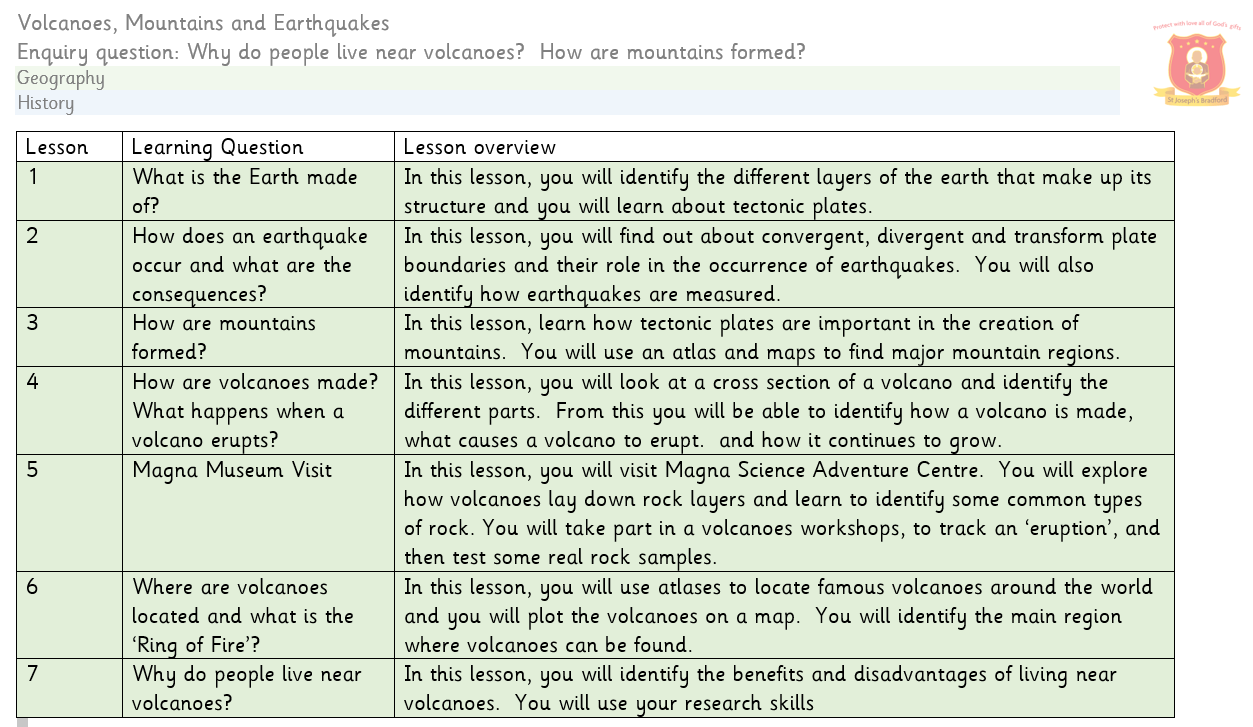Geography
“The truth is: the natural world is changing. And we are totally dependent on that world. It provides our food, water and air. It is the most precious thing we have and we need to defend it.” - Sir David Attenborough
Subject leader: Miss T Parker
At St Joseph’s, we make geography meaningful and memorable. We want to equip our children with the skills and confidence to explore the world around them; particularly places beyond BD5. Our staff have worked hard to create a curriculum that is exciting and relatable for our children. We want our children to be enthusiastic and curious about the ever-changing world around them and have opportunities to learn about our local area in depth. By the time our children leave our school, they will know how to be active global citizens through showing respect, consideration, and appreciation for our world, and even God's creation. The aim of our geography teaching is that children will ask themselves: What choices can I make? How can I care for the environment? Where do I want to explore?
How do we make our curriculum ambitious for all pupils and develop their cultural capital?
We value the importance of real-life experiences and want to give our children many opportunities to explore the geography around and beyond our school. We feel that this is significant in developing our children's’ place knowledge and creating opportunities for fieldwork. These rich experiences make geography relatable to the children and provide memories that they will remember throughout school. We want our children to have a deep understanding of Bradford and our local community. Our children get to explore Malham, Nellbank, Buckden, Bradford City Centre and Saltaire.
At St Joseph’s, all of our children have opportunities to access learning about the world in which we live. We want our children to be confident in asking questions about their surroundings. We celebrate the diversity in our school by learning about the way that others live. We address misconceptions about places to encourage our pupils to be open-minded about the world. We get the chance to look at the physical and human features of familiar/unfamiliar areas. We have thought carefully about our selection of books, which deep our children's understanding of place and location. KS1 and EYFS work hard to create provision that encourage our pupil's geographical thinking.
We want our children to care about the environment and know that there are choices to make a difference, locally and globally. We want them to have confidence to explore and travel, whether it may be far or near. We want them to see the world as an adventure!
How do we teach Geography?
In our school, we have some mixed ages class in KS1 and KS2, where the geography curriculum is taught on a two-year cycle, along with history. Our lessons are planned based on a sequence of questions, which help towards answering an overall enquiry questions. Our knowledge mats and lesson sequences help our pupils to understand what they have learned and what they will learn. Across all year groups, there are opportunities for educational visits and fieldwork. We have access to a range of resources that we use to teach geography, such as: large maps, atlases, globes, compasses, Digimaps and Oddizzi.
How geography is assessed:
To assess learning, we look at how children are able to answer the enquiry questions and the geography vocabulary they use. We present our learning in a range of ways, such as: double-page spreads, drama, discussions (oracy), paired/group tasks, and quizzes. We use quizzes to recall knowledge we have previously learned. This helps teachers to decide what they need to teach next and what may need revisiting. We have a large focus on vocabulary, which children can find on their knowledge mats, vocabulary grids and working walls. The level of terminology progresses throughout the year groups. EYFS use Early Learning Goals from the Statutory Framework and the guidance document Development Matters to assess children's development in 'Understanding the World'.
-
Geog Year 1 and 2 Overview
download_for_offline
download_for_offlineGeog Year 1 and 2 Overview
- Geog Year 3 and 4 Overview download_for_offline
download_for_offlineGeog Year 3 and 4 Overview
- Geog Year 5 Overview download_for_offline
download_for_offlineGeog Year 5 Overview
- Geog Year 6 Overview download_for_offline
download_for_offlineGeog Year 6 Overview
- Geog Year 3 and 4 Overview download_for_offline






